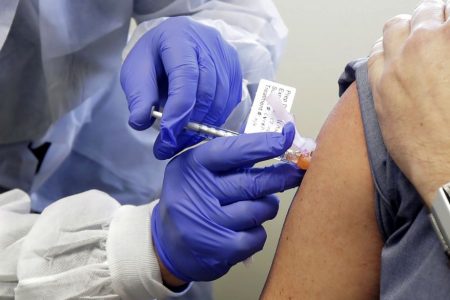Scientists have done what was thought to be impossible and that is to produce COVID-19 vaccines in a matter of months. But now the real battles begin.
 What is the priority for delivering the vaccine? Who gets it first — medical personnel, other first responders, the elderly, people of color? Should some states have priority over others? Should some high-priority non-Americans receive the vaccine before all Americans have been inoculated?
What is the priority for delivering the vaccine? Who gets it first — medical personnel, other first responders, the elderly, people of color? Should some states have priority over others? Should some high-priority non-Americans receive the vaccine before all Americans have been inoculated?
Some people will resist being inoculated — but should they be required to be? The question of vaccine mandates has been around for a long time, going back to requirements that all be inoculated for smallpox.
Thomas Hazlett, a distinguished professor of law and economics, wrote this past week: “[T]he most basic function of government is to protect against extreme hazards that, owing to free-rider problems, are not well supplied by voluntary cooperation, like foreign invasions, mosquito abatement, and epidemics.
“When such a threat can be solved by relatively safe inoculations, the legislation assumes responsibility for crafting rules that substitute for (impractical, unattainable) contracts. To leave the choices entirely to individuals allows great harms to be inflicted that cannot be adjudicated (under tort or criminal sanctions) because the perpetrators of disease cannot be effectively detected.”
The issue of the right of the state was at least partially settled back in 1905, in the U.S. Supreme Court case, Jacobson v. Massachusetts, in which the court upheld the authority of the states to enforce compulsory vaccination laws.
By a 7-2 majority, the court held that “in every well-ordered society charged with the duty of conserving the safety of its members the rights of the individual in respect to his liberty may be at times, under pressures of great dangers, be subjected to such restraint, to be enforced by reasonable regulations, as the safety of the public may demand.”
The court recognized there may be exceptions. For example, there are individuals whose bodies react poorly to vaccinations and obviously they should be exempt.
Most schools require that students be vaccinated for many common childhood diseases before being admitted to the school. In some places, notably California, a significant number of parents have refused to have their children vaccinated for a variety of reasons, including religion or personal belief. This has led to outbreaks of measles, which can be severe or even life-threatening to some.
There are many Americans, including public officials like New York’s Gov. Andrew Cuomo, who have expressed a distrust toward a vaccine — for no discernable reason. His actions in putting known infected COVID-19 patients in nursing homes with healthy patients, resulting in tens of thousands excess deaths, does not appear to be enough for him.
Initially, there will be more demand for vaccinations than can be supplied, so no mandates will need to be enforced. A recent Gallup poll reported that 42% of Americans do not want to be vaccinated. The sensible government policy would be to vaccinate the first responders and the elderly, particularly those with underlying conditions. Hopefully, that can be done in the next several months. With luck, herd immunity might have been achieved by that time.
COVID-19 is highly contagious but only relatively lethal for a subsegment of the elderly. If this continues to hold, once almost all of those whose lives are in the high-risk category have been vaccinated, it may not matter much if a relatively large number of younger people choose not to get vaccinated. To avoid unnecessary conflict and preserve liberty, the heavy foot of government should be avoided — which can be achieved by having a limited vaccination mandate on the most vulnerable.
A carrot rather than a stick approach tends to work better and again avoids conflict. Those wishing to travel internationally could be required to show that they have been vaccinated or have acquired the immunity anti-bodies.
Years ago, all of us who traveled to certain high-risk countries were required to have smallpox and some other vaccinations in order to obtain a visa. Virtually all regarded it as a reasonable requirement that did not unduly trample on essential liberties. Schools could also require proof of the COVID-19 vaccination or anti-body immunity before attendance is allowed.
The Biden transition team has indicated it is planning to impose a top-down vaccine allocation scheme — with government civil servants making the decisions — rather than allowing the market to operate. This is a mistake — because history shows that the bureaucrats are often indifferent and slow, and respond to political pressures, rather than real needs.
Recall, the Veterans Administration was a long-running disaster, resulting in neglect and many unnecessary deaths until the Trump administration enabled market competition.
If bureaucratic processes result in not meeting timely demands for the vaccines, black markets will almost certainly appear, which frequently corrupts government officials.
Vaccine wars can largely be avoided through rational policies that utilize market forces, and carrots rather than sticks for constructive ends.
https://www.washingtontimes.com/news/2020/nov/23/let-the-covid-19-vaccine-wars-begin/